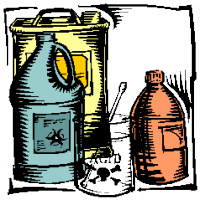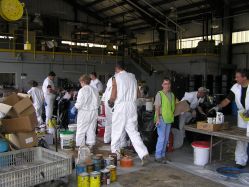
Site Owned by Upper Valley Lake Sunapee Regional Planning Commission
 Our decision to purchase one product over another is generally determined by its price and effectiveness with media advertising being the primary source of such information. Unfortunately, we are not always aware of the toxic nature of these products nor do we consider the environmental or health effects resulting from their use or disposal.
Our decision to purchase one product over another is generally determined by its price and effectiveness with media advertising being the primary source of such information. Unfortunately, we are not always aware of the toxic nature of these products nor do we consider the environmental or health effects resulting from their use or disposal.
As consumers, we may not always be aware of the toxic chemicals or dangerous materials that make up the ingredients of the products we bring into our homes. When stored or used improperly, one product's vapors may react with the chemicals in another product creating toxic gases, poisonings and even fires. Every day, we throw products like drain cleaners, medications, pesticides, bleaches and fluorescent lamps into the household trash where they are free to come in contact and react with each other. Even if the chemicals in these products don't react in the garbage, their disposal as solid waste could allow them to leak into the environment where they would contaminate the air we breathe and water we drink. Click here to download a publication reviewing alternatives for municipal HHW collection.
A hazardous waste is a waste that exhibits a hazardous characteristic or is a listed waste. There are four criteria that define a characteristic waste:
VISIT OUR HHW WEB SITE TO SEE THE HHW COLLECTION SCHEDULES, NONTOXIC CLEANING RECIPES, AND LOT OF OTHER GREAT INFORMATION.
Resources for Household Hazardous Waste
 To avoid disposal problems, consider buying less hazardous products. A product's label provides a quick and easy way to judge the product's hazard level or the type of hazard it poses.
To avoid disposal problems, consider buying less hazardous products. A product's label provides a quick and easy way to judge the product's hazard level or the type of hazard it poses.
2009 HHW Collection at Lebanon Landfill
SITE SEARCH